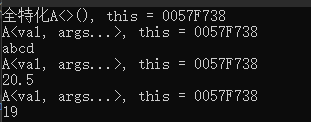#include<iostream>
using namespace std;
/*泛化*/
template <typename... args>
class A
{
public:
A()
{
cout << "泛化A<>(), this = " << this << endl;
}
};
/*特殊的版本,不是全特化*/
template <>
class A<>
{
public:
A()
{
cout << "特殊的版本A<>(), this = " << this << endl;
}
};
/*偏特化*/
template <typename T, typename... args>
class A<T, args...> : public A<args...> //这里public继承也行,网上的很多是private继承
{
public:
A(T v, args... vs): m_i(v), A<args...>(vs...) //要在初始化列表里调用 A<args...>的构造函数进行初始化操作
{
cout << "A<val, args...>, this = " << this << endl;
cout << v << endl;
}
T m_i;
};
int main()
{
/*可变参类模板,通过继承方式进行递归展开
这里当参数包展开到0的时候会调用全特化的版本,当然,
如果没有全特化版本的就会去调用泛化版本的*/
A<int, double, string> v(19, 20.5, "abcd");
}

上面的代码会生成以下的实例,具体的继承关系如下:
template <>
class A<>
{
public:
A()
{
cout << "A<>(), this = " << this << endl;
}
};
template <>
class A<string> : public A<>
{
public:
A(string val) : m_i(val), A<>()
{
cout << "A<string> : " << m_i << endl;
}
string m_i;
};
template <>
class A<double, string> : public A<string>
{
public:
A(double val, string arg1)
: m_i(val), A<string>(arg1)
{
cout << "A<double, string>() : " << m_i << endl;
}
double m_i;
};
template <>
class A<int, double, string> : public A<double, string>
{
public:
A(int val, double arg1, string arg2)
: m_i(val), A<double, string>(arg1, arg2)
{
cout << "A<int, double, string>() : " << m_i << endl;
}
int m_i;
};
实例化时,先调父类的构造函数,后到子类的构造函数。
具体的实例可以利用vs里面的dumpbin命令把目标文件导出进行分析。

同样也可以用在非类型模板参数和模板模板参数上面
namespace _nmsp2
{
//主模板定义(泛化版本的类模板)
template <int ...FTArgs> //int 替换为auto也可以
class myclasst2
{
public:
myclasst2()
{
printf("myclasst2::myclasst2()泛化版本执行了,this = %p\n", this);
}
};
template <int First, int ...Others> //int替换成auto也没问题
class myclasst2<First, Others...> :private myclasst2<Others...> //偏特化
{
public:
myclasst2()
{
printf("myclasst2::myclasst2()偏特化版本执行了,this = %p,sizeof...(Others)=%d,First=%d\n", this, sizeof...(Others), First);
}
};
}
namespace _nmsp3
{
//泛化版本
template<typename T,
template<typename> typename... Container>
class ParentMM
{
public:
ParentMM()
{
printf("ParentMM::ParentMM()泛化版本执行了,this = %p\n", this);
}
};
template<typename T,
template<typename> typename FirstContainer,
template<typename> typename... OtherContainers>
class ParentMM<T, FirstContainer, OtherContainers...> :private ParentMM<T, OtherContainers...> //偏特化
{
public:
ParentMM()
{
printf("ParentMM::ParentMM()偏特化版本执行了,this = %p,sizeof...(OtherContainers)=%d\n", this, sizeof...(OtherContainers));
m_container.push_back(12);
}
FirstContainer<T> m_container;
};
template<typename T,
template<typename> typename... Container>
class myclasst3 :private ParentMM<T, Container...>
{
public:
myclasst3()
{
printf("myclasst3::myclasst3()执行了,this = %p,T的类型是:%s,Container参数个数是%d个\n",
this,
typeid(T).name(),
sizeof...(Container));
}
};
}